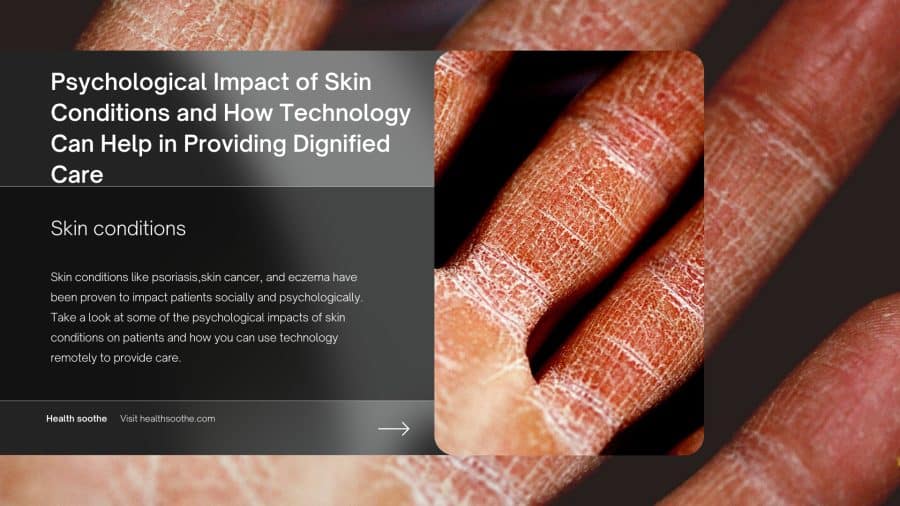Skin conditions like psoriasis,skin cancer, and eczema have been proven to impact patients socially and psychologically. The impact sometimes gets to a point where the patients limit their life, affecting their work performance and bringing psychosexual problems if they are adults. However, you can now easily reach such patients without them visiting your office.
Often webinar conduct by experts, there are coming together to discuss the difference between traditional and decentralized clinical trials (DCTs). In addition, they discuss how medical practitioners can leverage technology to provide care in a way that will alleviate the psychological problems the patients face. Below are some of the psychological impacts of skin conditions on patients and how you can use technology remotely to provide care.
Low Self-Esteem
Patients with chronic skin conditions are trapped in a vicious cycle that leaves them with low self-esteem. The feeling of low self-esteem grows from years of mistreatment, especially if the skin condition is visible. In most cases, peers will mistake them for being contagious even if the marks are not. Such a patient may find it difficult to participate in social events due to low esteem. In the worst-case scenario, they might end up postponing anappointment. Fortunately, you can use technology for consultation and prescribe medication like eczema treatment. With a functional system, they can order medicine from an online store.
Self Isolation
Some patients resort to self-isolation to avoid people seeing their skin condition. According to a study by National Centre for Biotechnology Information, patients choose to be on their own, which predisposes them to mental health disorders. As a dermatologist, it’d be best to follow up and check if your patient has developed the urge to self-isolate, especially if the skin disease isn’t contagious. You should also advise the family members to provide the patient with appropriate psychological support. If in school, the teachers should train other children to be accommodative. Doing so will prevent the patient from isolating themselves.
Stress and Anxiety
Visible skin conditions can cause stress and anxiety to patients, especially teenagers. This situation is aggravated by the mainstream use of social media, where they could spend most of their time. The constant reminder that their skin isn’t perfect commercials make them more stressed. Unfortunately, this psychological condition worsens skin problems like acne. Their body release stress hormone, which flares up the condition. Using telemedicine, you can walk them through ways of overcoming stress and give them the best skincare routine to reduce the condition. For instance, you can suggest yoga with the medication you prescribe.
Depression
Most patients suffering from permanent skin conditions like vitiligo or peeling skin tend to be depressed from learning about their situation. The depression level may vary among dermatology patients. However, the condition worsens when the patient undergoes psychosocial stages. Enrolling such a patient into a therapy session would be best to avoid fatal outcomes. On top of that, you can convince them to do clinical trials where they can be first in line for new medication and earn while at it.
Disgust
A 2020 study neglected in the dermatology field found that patients suffering from conditions like psoriasis feel disgusted by their condition. Conducted through a Touch-Shame-Disgust-Questionnaire (TSD-Q), the study’s outcome showed that of 170 patients questioned, most were disgusted with their condition. Unfortunately, this negative emotion can make it difficult for such patients to accept their condition. This is because of constant reminders and the feeling of nausea. As a medical practitioner, giving such patients a skincare routine and medication would be best to help them overcome the feeling.
Stigmatization
Untrained eyescan’t differentiatebetween contagious skin infections and non-contagious ones. This problem puts a lot of burden on visible skin disease. In most cases, colleagues and/or members of the same peer will avoid them due to the fear of infection. As a result, patients may find them more alone and depressed, which can drive them to the edge. You have to explain to the patient their condition well so they won’t feel bad about it. If possible, you should tell them to embrace it and explain it to their close friend, who will make them feel welcome.
Embarrassment
Some conditions like boils, aging skin, and red face can be embarrassing, but with little to do about it. Unknown to those who don’t suffer, some conditions are painful, and teasing the patient about the conditions worsens how they feel psychologically. The patient can take days off and be under a caregiver who can help them until their situation changes. If it persists, it’d be best to book the patient for a therapy session where you can walk them through how to live with the condition as they seek further medical help.
Poor Quality of Life
Lastly, the skin condition causes poor quality of life among dermatology patients. A Quality of Life Assessment and the result indicate that most patients can’t cope with their condition. Instead, they had a negative attitude towards it. This feeling can affect their work output or academic performance if they are students. As a dermatologist, you should hold regular sessions with the patient online and assure them that they aren’t alone in their struggle. You should also prescribe effective skin condition medication like eczema treatment. It’d be best to train the family members to encourage the patients as they undergo medication.
According to the National Library of Medicine, skin diseases are among the most common health conditions worldwide, which come with many burdens that most patients can’t bear. Unfortunately, many medical practitioners downplay these effects and insist on conventional methods like in-person visits. In server conditions, the patient may miss an appointment due to the embarrassment of being seen in their condition.
But there are many webinars conducted by experts in the health sector are the bestplaces to learn more about providing care for patients using digital health technologies. In doing so, you will reach even the patients with acute psychological conditions caused by skin infections.


